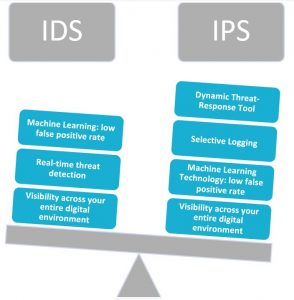Cyberattacks, as well as the malicious actors behind them, have become more sophisticated and harder to prevent. To best protect your company, it is important to know which Software-as-a-Service (SaaS) solution will keep intruders out. For businesses to practice data safety protocol, SaaS solutions are absolutely necessary. The dilemma, however, is with the growing number of SaaS solutions being created by different developers it can be difficult to decide which SaaS will best protect your company from malicious cyberattacks.
For example, Intrusion Prevention Systems and Intrusion Detection Systems – are very similar SaaS solutions, leaving decision makers to think the two are equally redundant and unnecessary. So, which is the ‘better’ asset to complement your current security strategy, IPS or IDS?
Intrusion Protection Systems (IPS) vs. Intrusion Detection Systems (IDS)
IPS – Intrusion prevention systems control the access to an IT network and protect it from abuse and attack. These systems are designed to monitor intrusion data, investigate the escalating threat, and take the necessary action to prevent an attack from developing.
IDS – Intrusion detection systems will simply monitor the network and send alerts to systems administrators if a potential threat is detected. IDS solutions are designed to discover potential threats to the environment and inform the end-user so appropriate action can be taken.

IDS solutions are very valuable to organizations seeking around-the-clock monitoring, they also have serious drawbacks. For example, IDS systems are great in detecting when ridding-action is necessary but, are unable to rid of a malicious actor on its own. In simpler words, an IDS solution still leaves a network or cloud environment unprotected.
IPS solutions are even more valuable to an organization because of one key component, the dynamic threat response tool. Because the IPS can act in real-time, rather than handing the alert over to the end-user for riddance, it is less work for your IT team, mitigates risk in responding to attacks appropriately, and is self-sustainable.
Modern networked business environments require high-level security to ensure safe and trusted communication of information between organizations and internally. An IDS System is an informative tool but cannot protect your organization once external or internal threats arise. An Intrusion Prevention System poses as an adaptable security blanket service for security after complementary technologies fail. As cyberattacks become more sophisticated and complexity continues to rise, it is even more important that protection solutions adapt with them.
Network vs Host-Based IPS Systems
IPS solutions are far more superior than an IDS however, there are two different ways to run an IPS system at your organization; an IPS can either monitor an entire network or it can be launched as an application to monitor each end point that enters the digital environment.
Network based IPS (NIPS) are great in stopping malicious traffic from traveling across the entire environment. What it fails to do is monitor each device’s activity and cannot determine whether there is an attacker sitting at a computer on the network. However, host based IPS (HIPS) are launched on each device as an application software. Because of this, HIPS are far more advanced as it can record action and security logs for every device across a network. This is a clear indication that every company should adopt a HIPS solution to protect themselves from external and internal threats.
It’s important to note that developing a HIPS system can be very costly and in-fact, might not be a fit for an IT budget. Beyond the expenses of creating a HIPS internally, it requires time and expertise. Consider outsourcing your firm’s cybersecurity needs to a company that specializes in HIPS solutions.
Cyberattacks are becoming stronger and require expert attention. Put your worries to rest by adopting an in-house monitoring and detection service; AgileBlue’s SOC-as-a-Service offers 24/7 monitoring and threat detection, so you can rest easy knowing that your cloud and network are protected. When threats arise, put your trust in our advanced machine learning, user behavior analytics, backed by our team of cybersecurity experts.
Want to learn more about AgileBlue’s one-of-a-kind SOC-as-a-Service? Visit us.




